Survey shows new visa rules are encouraging international students to apply to more destinations
- New IDP Education research shows that more international students are considering – and applying to – an expanded range of destinations
- Canada has lost significant share of student interest over the past year
The latest edition of the IDP Education Emerging Futures survey shows that Australia, the UK, and especially Canada are losing share of interest among international students around the world. The US is benefitting from this trend, as are alternative destinations.
The survey – conducted from 20 August–16 September 2024 with 6,000+ student respondents in 114 countries – also shows that some students are foregoing or delaying study abroad plans because it is too expensive at this time.
IDP’s Emerging Future’s research has been ongoing since March 2022. This latest round is the sixth iteration of the initiative.
Student profiles
As the following chart shows, most surveyed students were prospective or had applied to at least one institution. More than half were at the postgraduate level, with 27% at the undergraduate level. India and China were the two most-represented markets, with the Philippines, Bangladesh, Pakistan, Nigeria, Nepal, Indonesia, Ghana, and Vietnam rounding out the top 10 nationalities by response volume
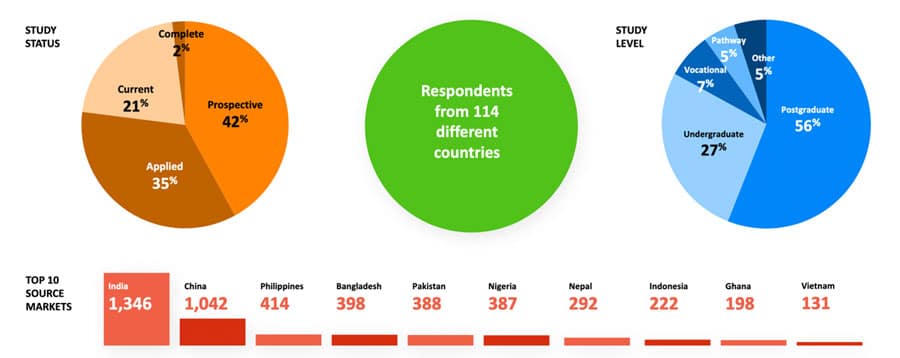
Destination preferences
Australia remains the destination of choice (24%), followed closely by the US (23%) and then by the UK (21%). Canada has fallen to fourth place (16%) and has weakened significantly, down nine percentage points since August 2023. Australia lost significant share among prospective students but not applied students, while Canada lost appeal among both prospective and applied students. IDP says even students who have applied to Canada are reconsidering their decision due to visa delays and policy uncertainty.
Meanwhile, “other destinations” are the top choice of 11% of students, up the most (six percentage points) of all the options students were given. This finding is in keeping with separate research confirming that students are widening their scope of potential destinations, and it is backed as well by findings presented at the recent ICEF Monitor Global Summit.
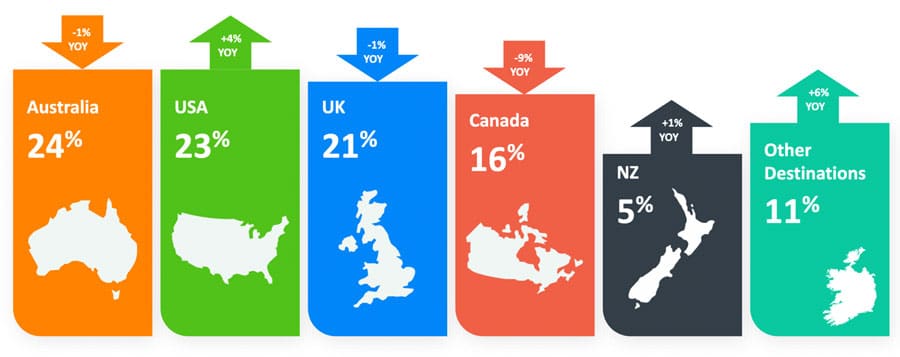
Key drivers of choice
As shown in the chart below, more than half of students said that post-study work opportunities are the most important factor driving their decisions. Next in line are pathways to permanent residency (43%), financial requirements for visas (42%), and student visa fees and associated costs (41%). More than a quarter of students also said they look at dependants’ rights when choosing a study destination
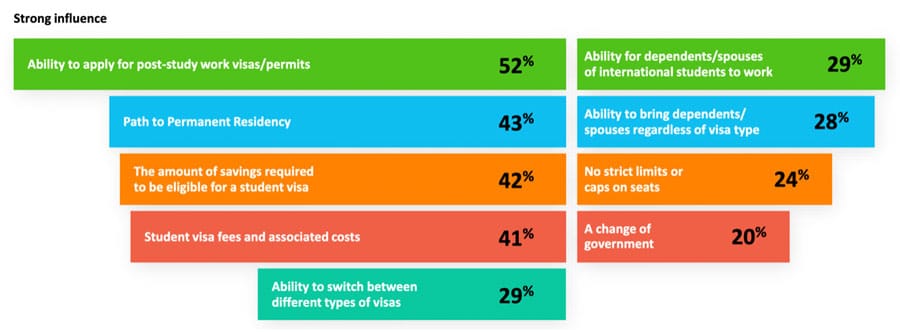
This suggests that students are highly aware of policy changes in top destinations. These include:
- Australia and Canada raising their proof-of-savings requirements to US$19,535 and US$14,945 per student, respectively;
- Australia hiking its visa application fee to US$1,070, a 125% increase;
- The UK ending families’ rights to accompany international students unless students are in research-oriented postgraduate degrees or on scholarships;
- France requiring international students to have lived in France for 24 months (up from 18 months) if they want to bring dependants;
- Canada ending the right of partners of undergraduate students and students in master’s programmes of less than 16 months to receive an open work permit.
All these policies are affecting the shape of international student mobility and contributing to the rise of alternative destinations. Germany is one of the destinations becoming much more popular, even though it raised its savings requirement to US$12,875 this year. This is still much less than the amount students need for Australia and is a bit less than what Canada asks for as well.
Students are hedging bets
Fully 66% of students are considering more than one destination, and almost half are considering at least three. They are carefully weighing their options and willing to switch if a destination becomes more appealing in terms of post-study opportunities, affordability, visa flexibility, and dependants’ rights. A positive change in post-study work opportunities would be the biggest driver of a change of destinations, followed closely by a lessening of visa costs, as shown in the chart below.
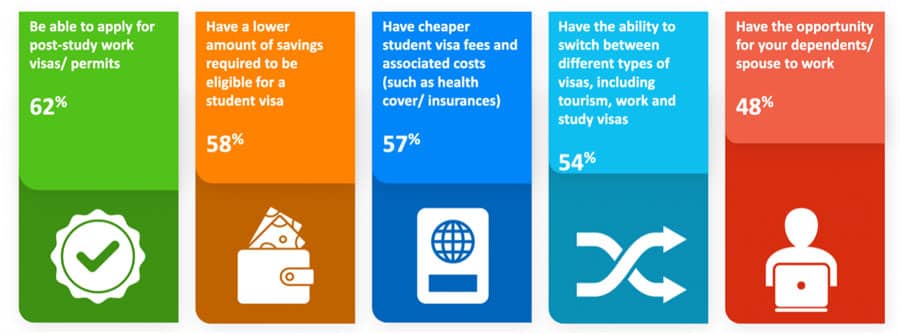
Study abroad is becoming too expensive for some
Of the small segment of surveyed students (3%) who said they are putting their study abroad plans on hold, the largest proportion said that tuition fees are the main barrier, followed by those citing costs of living and costs of visas. More than a quarter also said, “it is too difficult getting a student visa.”
However, IDP notes that almost half of those who have opted out of applying to study abroad this year said they were “highly likely” to apply in the next couple of years.
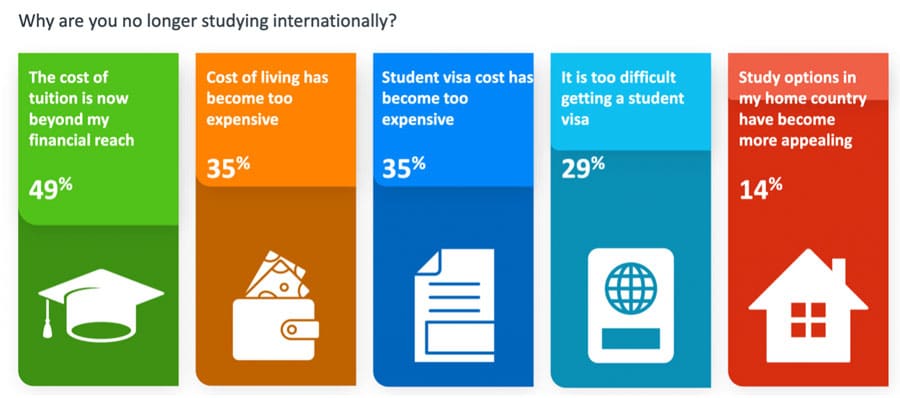
The US is ahead
Survey respondents rates the US more positively than Australia, Canada, the UK, and New Zealand on the key dimensions of quality of education, value for money, and graduate employment opportunities. The results of the US election may see different results in the future, though an IDP research survey earlier this fall found that only 35% said the election may influence their decision, either slightly or significantly. Of that finding, Dr Fanta Aw, CEO of NAFSA, said: “The IDP research shows that students are consistently focused on practical aspects of studying abroad, such as quality of education, which students rank higher for the US than any other destination.”
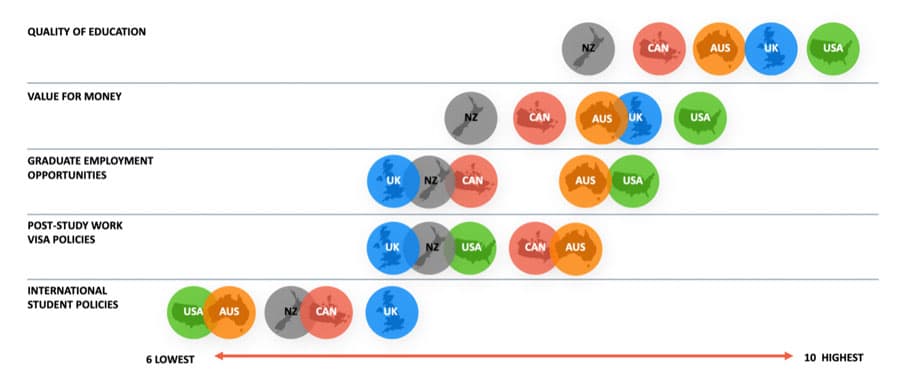
Students are informing themselves more than ever
There was a time, say 10–15 years ago, when international students automatically assumed the US, UK, and Australia were the most desirable destinations, while also becoming more aware of Canada’s competitive strengths. Then around 2016, Canada surged in popularity for reasons including post-study work and immigration opportunities and value for money, joining the league of the so-called Big Four English-speaking destinations.
But since the pandemic, international students have shown themselves to be savvy researchers who look at a multitude of pros and cons for each destination under consideration. Institutions, and governments, need to know that students can and will change their minds at any time, depending on which study path and destination is most aligned with their budget, priorities, and post-study plans.
For additional background, please see:
















